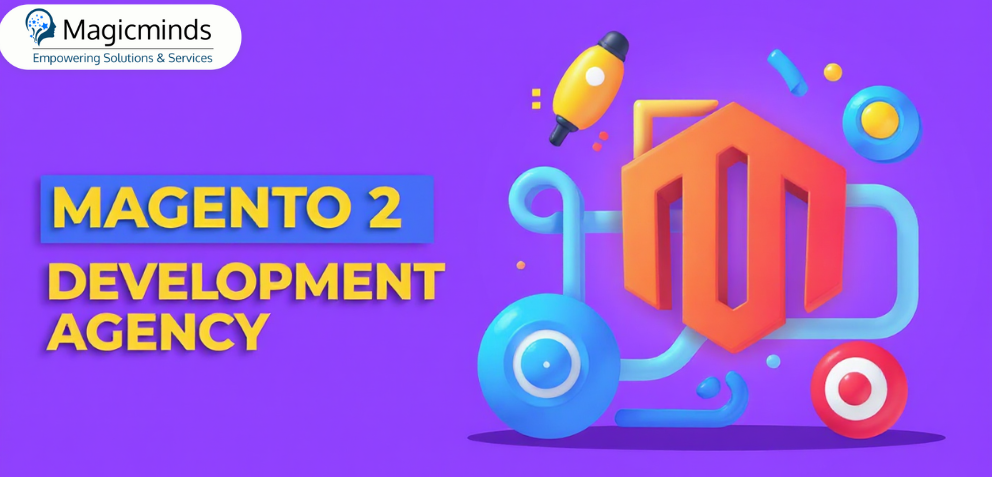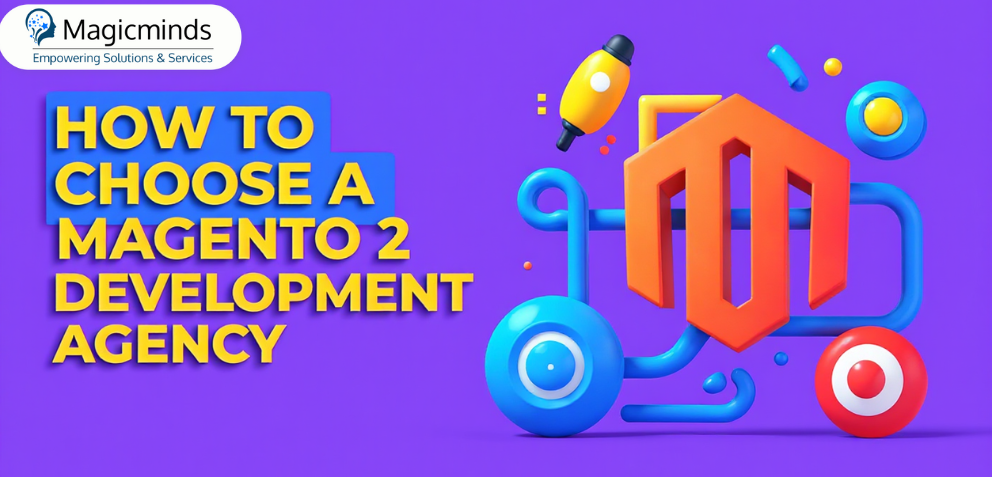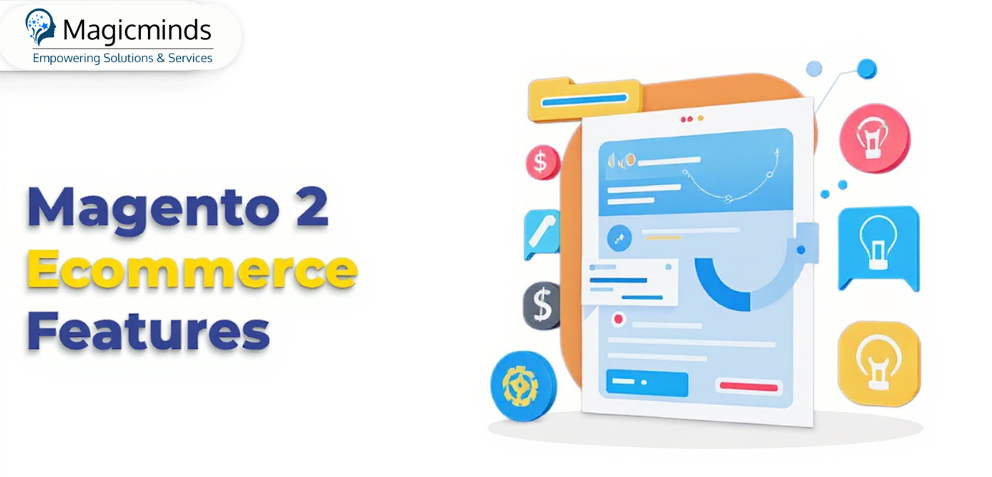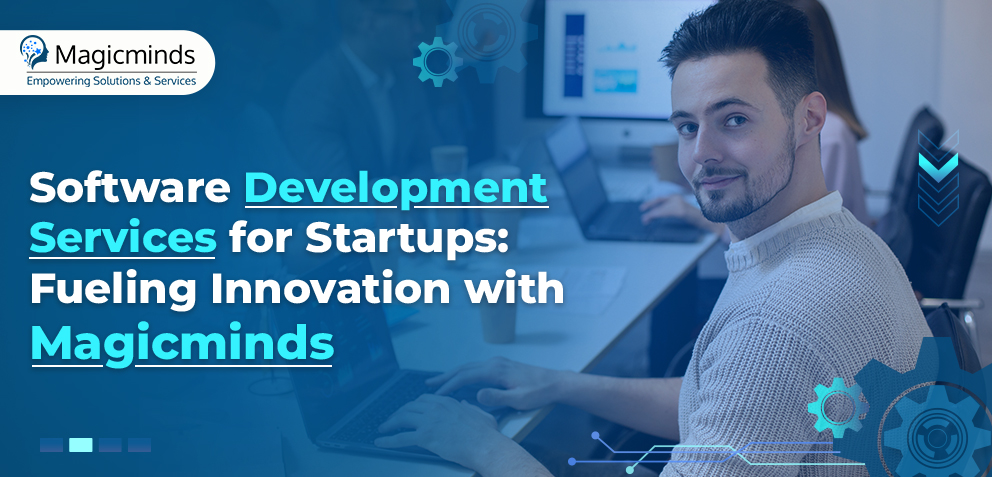Top Magento 2 Development Agencies in the US: A Complete Guide for Ecommerce Brands

 Stay In-the-loop
Stay In-the-loop
Get fresh tech & marketing insights delivered right to your inbox.
Share this Article
Tags
Category
- .Net Developer
- Adtech
- Android App Development
- API
- App Store
- Artificial Intelligence
- Blockchain Development
- Chatbot Development
- CMS Development
- Cybersecurity
- Data Security
- Dedicated Developers
- Digital Marketing
- Ecommerce Development
- Edtech
- Fintech
- Flutter app development
- Full Stack Development
- Healthcare Tech
- Hybrid App Development
- iOS App Development
- IT Project Management
- JavaScript development
- Laravel Development
- Magento Development
- MEAN Stack Developer
- MERN Stack Developer
- Mobile App
- Mobile App Development
- Nodejs Development
- Progressive Web Application
- python development
- QA and testing
- Quality Engineering
- React Native
- SaaS
- SEO
- Shopify Development
- Software Development
- Software Outsourcing
- Staff Augmentation
- UI/UX Development
- Web analytics tools
- Wordpress Development
Selecting the appropriate Magento 2 development agency can make or break your online store. As shoppers demand faster, safer, and more personalized journeys, retailers must respond with platforms that grow with them. Magento 2, renowned for its robust toolkit and extensive customization options, remains the backbone for brands pursuing ambitious e-commerce goals. Irrespective of whether you intend to launch a fresh site or upgrade an aging instance, a reputable Magento development agency in the US will provide seasoned developers, shorten your time-to-launch, and lay the groundwork for ongoing stability. This guide guides merchants through the steps of assessing potential partners and making an informed choice.
What is a Magento 2 Development Agency?
Such an agency focuses exclusively on crafting, refining, and expanding stores built on Magento’s open-source framework. Their service stack typically includes initial setup, bespoke theme work, custom extensions, seamless third-party connectors, and reliable post-launch support.
Further, Magento Open Source powers many smaller operations, while Adobe Commerce—the platform’s enterprise cousin—delivers hosted cloud infrastructure and premium tools. Although both packages share core strengths, Adobe Commerce packs extras such as AI-driven insights, dedicated B2B modules, and automated backups, making it the go-to choice for large-scale retailers.
Why Choose Magento 2 for Your Ecommerce Business?
Magento 2 stands out because it is one of the most flexible and scalable ecommerce platforms on the market.
Scalability and Flexibility
It handles large product catalogs, supports multiple languages and currencies, and grows easily with expanding brands.
PWA and Headless Options
Magento 2 also supports Progressive Web Apps and headless setups, boosting page speed, shopper experience, and seamless cross-channel links.
Customization Freedom
Thanks to the platform’s modular design, brands can adjust everything from the checkout path to backend tasks.
Types of Magento Development Agencies
Finding the right ecommerce Magento development agency begins with knowing the kinds of agencies that exist.
Specialized vs Full-Service
Specialized studios focus only on Magento and offer deep technical know-how, while full-service firms manage design, SEO, marketing, and development all in one place.
US-Based vs Offshore
US-based shops provide easier communication, overlapping hours, and local compliance, whereas offshore teams may be cheaper but often demand tighter oversight.
Custom Magento Development for Startups
Build, Launch, and Scale with Magicminds' Expertise
How to Choose the Right Magento 2 Agency in the US
A dependable Magento development agency in the US will share clear proof of skill and measurable client wins.
Magento Certification
First, check for certified developers, a sign they follow the latest platform standards and best practices.
Proven Portfolio
Then review their past work, the industries they’ve served, and the scale of those stores to see if they fit your project.
Experienced Agencies
A team that knows your industry delivers solutions that speak your language and convert visitors.
Red Flags to Avoid
Steer clear of unclear prices, missing maintenance plans, or advisors who only know Magento in theory.
Magento 2 Services You Should Expect
Your Magento 2 development agency should provide a broad range of technical services.
Custom Module Development
Developers craft bespoke modules that add functions absent from the default install.
Theme Customization
They design on-brand, mobile-ready storefronts that guide shoppers naturally toward checkout.
Performance Optimization
They tune caching, compress assets, and streamline code so pages load in a flash.
Magento Migration and Upgrade
Partners move data from Magento 1 or competitor platforms to Magento 2 with no lost orders.
Industry-Specific Magento 2 Solutions
Magento 2’s flexible architecture fits unique workflows in any sector.
For B2B Businesses
Agencies build bulk-order forms, quote managers, and pricing screens locked to each account.
For Fashion and Retail Brands
They assemble striking galleries, stock trackers, and recommendation engines that delight shoppers.
For Startups and MVP Launches
Teams deliver lean, scalable stores that let founders test ideas before heavy investment.
Common Challenges in Magento 2 Development (and How Agencies Solve Them)
A skilled Magento 2 development agency will anticipate and overcome technical hurdles.
Speed Issues
They fine-tune code, shrink images, and set up robust caching so sites respond instantly.
Complex Integrations
The team connects ERP, CRM, and payment platforms seamlessly to your Magento backend.
Security and Compliance
They apply regular patches, follow GDPR/PCI standards, and secure user data.
In Conclusion
Magento 2 provides a solid backbone for online shops that expect to expand quickly. Its adaptable code, room to grow, and cutting-edge tools like progressive web apps and headless set-up attract forward-thinking labels. Still, squeezing every drop from the platform means choosing the right Magento 2 development agency. A seasoned U.S. agency can tackle everything from custom modules to tricky system links, backed by years of trade insight. You might be starting a brand-new site or upgrading an aging one; these experts from a Magento development agency in the US deliver full-spectrum service. To keep your project on track, team up with consultants from MagicMinds who grasp your commercial aims. A reliable ecommerce Magento development agency will fine-tune speed, ensure the store scales, and push visitor clicks into sales.
Frequently Asked Questions (FAQs)
How much does Magento development cost?
The cost of hiring a Magento 2 development agency in the US can vary considerably, with project prices typically falling within a broad spectrum of $10,000 to upwards of $100,000. This substantial price range is influenced by several key factors. The specific features required for the ecommerce store play a significant role in determining the final cost; more complex functionalities and custom integrations will naturally lead to a higher investment.
How long does it take to build a Magento store?
The development of a fully functional Magento 2 online store, encompassing all critical stages from initial design conceptualization to robust code implementation and thorough quality assurance testing, typically requires an estimated duration of eight to sixteen weeks. This timeframe reflects the complexity involved in creating a complete and effective e-commerce platform tailored to meet specific business needs.
Do agencies help with ongoing support and marketing?
Yes, many firms provide ongoing support, performance tweaks, and even digital marketing as part of a longer-term agreement. Indeed, numerous Magento 2 development agencies extend their services beyond the initial website build. These firms frequently offer continuous technical support to address any arising issues, implement necessary security updates, and ensure the smooth operation of the e-commerce platform.
Furthermore, they often provide performance optimization services, proactively identifying and rectifying areas that could impact website speed and overall user experience.
Selecting the appropriate Magento 2 development agency can make or break your online store. As shoppers demand faster, safer, and more personalized journeys, retailers must respond with platforms that grow with them. Magento 2, renowned for its robust toolkit and extensive customization options, remains the backbone for brands pursuing ambitious e-commerce goals. Irrespective of whether you intend to launch a fresh site or upgrade an aging instance, a reputable Magento development agency in the US will provide seasoned developers, shorten your time-to-launch, and lay the groundwork for ongoing stability. This guide guides merchants through the steps of assessing potential partners and making an informed choice.
What is a Magento 2 Development Agency?
Such an agency focuses exclusively on crafting, refining, and expanding stores built on Magento’s open-source framework. Their service stack typically includes initial setup, bespoke theme work, custom extensions, seamless third-party connectors, and reliable post-launch support.
Further, Magento Open Source powers many smaller operations, while Adobe Commerce—the platform’s enterprise cousin—delivers hosted cloud infrastructure and premium tools. Although both packages share core strengths, Adobe Commerce packs extras such as AI-driven insights, dedicated B2B modules, and automated backups, making it the go-to choice for large-scale retailers.
Why Choose Magento 2 for Your Ecommerce Business?
Magento 2 stands out because it is one of the most flexible and scalable ecommerce platforms on the market.
Scalability and Flexibility
It handles large product catalogs, supports multiple languages and currencies, and grows easily with expanding brands.
PWA and Headless Options
Magento 2 also supports Progressive Web Apps and headless setups, boosting page speed, shopper experience, and seamless cross-channel links.
Customization Freedom
Thanks to the platform’s modular design, brands can adjust everything from the checkout path to backend tasks.
Types of Magento Development Agencies
Finding the right ecommerce Magento development agency begins with knowing the kinds of agencies that exist.
Specialized vs Full-Service
Specialized studios focus only on Magento and offer deep technical know-how, while full-service firms manage design, SEO, marketing, and development all in one place.
US-Based vs Offshore
US-based shops provide easier communication, overlapping hours, and local compliance, whereas offshore teams may be cheaper but often demand tighter oversight.
How to Choose the Right Magento 2 Agency in the US
A dependable Magento development agency in the US will share clear proof of skill and measurable client wins.
Magento Certification
First, check for certified developers, a sign they follow the latest platform standards and best practices.
Proven Portfolio
Then review their past work, the industries they’ve served, and the scale of those stores to see if they fit your project.
Experienced Agencies
A team that knows your industry delivers solutions that speak your language and convert visitors.
Red Flags to Avoid
Steer clear of unclear prices, missing maintenance plans, or advisors who only know Magento in theory.
Magento 2 Services You Should Expect
Your Magento 2 development agency should provide a broad range of technical services.
Custom Module Development
Developers craft bespoke modules that add functions absent from the default install.
Theme Customization
They design on-brand, mobile-ready storefronts that guide shoppers naturally toward checkout.
Performance Optimization
They tune caching, compress assets, and streamline code so pages load in a flash.
Magento Migration and Upgrade
Partners move data from Magento 1 or competitor platforms to Magento 2 with no lost orders.
Industry-Specific Magento 2 Solutions
Magento 2’s flexible architecture fits unique workflows in any sector.
For B2B Businesses
Agencies build bulk-order forms, quote managers, and pricing screens locked to each account.
For Fashion and Retail Brands
They assemble striking galleries, stock trackers, and recommendation engines that delight shoppers.
For Startups and MVP Launches
Teams deliver lean, scalable stores that let founders test ideas before heavy investment.
Common Challenges in Magento 2 Development (and How Agencies Solve Them)
A skilled Magento 2 development agency will anticipate and overcome technical hurdles.
Speed Issues
They fine-tune code, shrink images, and set up robust caching so sites respond instantly.
Complex Integrations
The team connects ERP, CRM, and payment platforms seamlessly to your Magento backend.
Security and Compliance
They apply regular patches, follow GDPR/PCI standards, and secure user data.
In Conclusion
Magento 2 provides a solid backbone for online shops that expect to expand quickly. Its adaptable code, room to grow, and cutting-edge tools like progressive web apps and headless set-up attract forward-thinking labels. Still, squeezing every drop from the platform means choosing the right Magento 2 development agency. A seasoned U.S. agency can tackle everything from custom modules to tricky system links, backed by years of trade insight. You might be starting a brand-new site or upgrading an aging one; these experts from a Magento development agency in the US deliver full-spectrum service. To keep your project on track, team up with consultants from MagicMinds who grasp your commercial aims. A reliable ecommerce Magento development agency will fine-tune speed, ensure the store scales, and push visitor clicks into sales.
Frequently Asked Questions (FAQs)
How much does Magento development cost?
The cost of hiring a Magento 2 development agency in the US can vary considerably, with project prices typically falling within a broad spectrum of $10,000 to upwards of $100,000. This substantial price range is influenced by several key factors. The specific features required for the ecommerce store play a significant role in determining the final cost; more complex functionalities and custom integrations will naturally lead to a higher investment.
How long does it take to build a Magento store?
The development of a fully functional Magento 2 online store, encompassing all critical stages from initial design conceptualization to robust code implementation and thorough quality assurance testing, typically requires an estimated duration of eight to sixteen weeks. This timeframe reflects the complexity involved in creating a complete and effective e-commerce platform tailored to meet specific business needs.
Do agencies help with ongoing support and marketing?
Yes, many firms provide ongoing support, performance tweaks, and even digital marketing as part of a longer-term agreement. Indeed, numerous Magento 2 development agencies extend their services beyond the initial website build. These firms frequently offer continuous technical support to address any arising issues, implement necessary security updates, and ensure the smooth operation of the e-commerce platform.
Furthermore, they often provide performance optimization services, proactively identifying and rectifying areas that could impact website speed and overall user experience.


